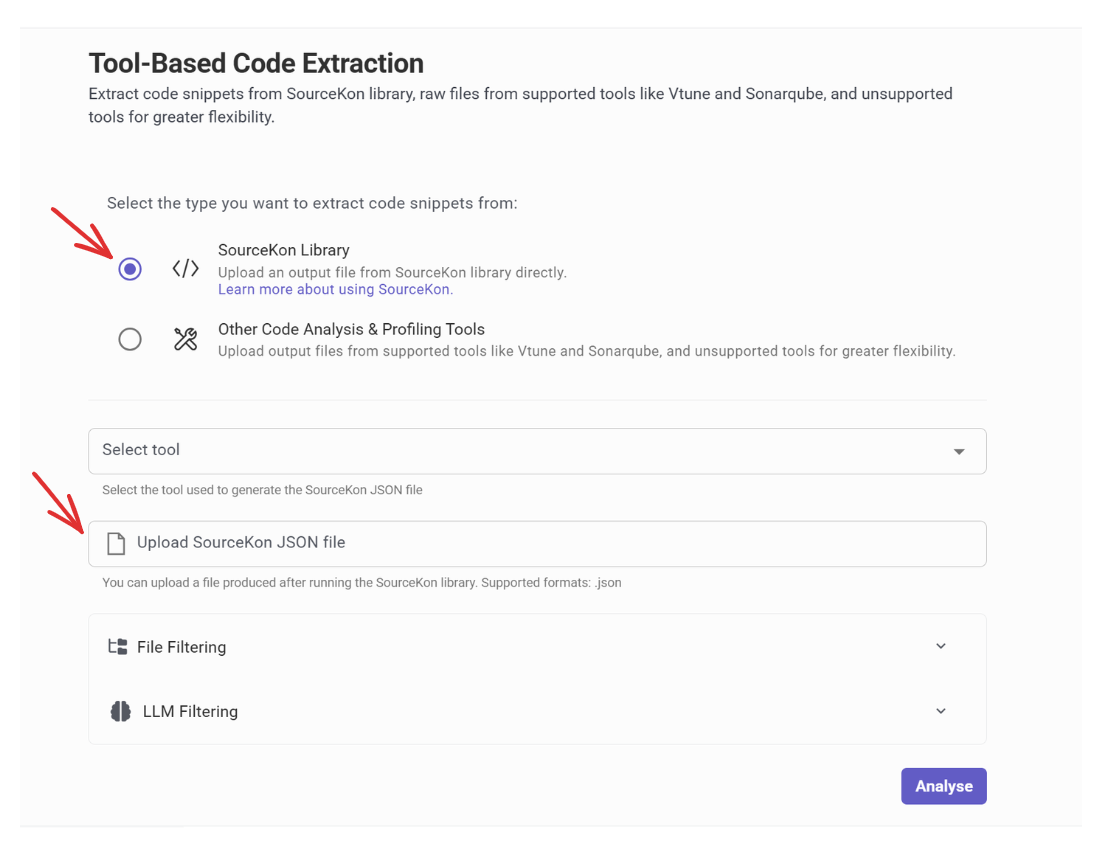Profiling with SourceKon
Watch the Artemis AI video tutorial on getting started profiling your projects with SourceKon here: Profiling your first Python project with SourceKon
SourceKon Overview
SourceKon is a profiling converter developed by TurinTech. It takes the output from popular profiling tools and converts them into a standardized JSON format that Artemis understands. This means you can keep using the tools you already know, but seamlessly integrate their results into Artemis.
SourceKon currently supports the following tools and languages:
| Tool | Type | Supported Languages |
|---|---|---|
| Intel VTune | Profiler | C, C++ |
| Speedscope (with PySpy) | Profiler | Python |
| PyLint | Linter | Python |
| Flake8 | Linter | Python |
| SonarQube | Code Security and Quality Analysis | See the SonarQube docs |
| Coverity | Code Quality Analysis | Java, C/C++, C#, JavaScript, Ruby, Python |
Download SourceKon
Download the archive file from the downloads page
SourceKon is compatible with Python versions up to 3.11.
Installation
- From within your extracted SourceKon directory create a new virtual environment for SourceKon.
python3 -m venv .venv
source .venv/bin/activate
- Install SourceKon using the wheel files provided.
python3 -m pip install --no-index --find-links wheels/ sourcekon
Profiling Python Projects with Speedscope
The speedscope profiling tool uses speedscope in combination with pyspy to produce a profile of your Python project. You should identify
an entry-point for your project, like a benchmark or main.py, to run that you can use to profile your project code.
Run the SourceKon speedscope CLI tool as in the example below to generate a profile of your project.
sourcekon speedscope \
--project_path /path/to/projectdir \
--executable_path /path/to/entrypoint.py \
--output_path /path/to/outputdir
Troubleshooting
Empty Output File
If there are no snippets in the constructs section of the output file try running the py-spy command from the SourceKon output in isolation. You may have issues with your py-spy installation or build environment that are causing py-spy to fail silently in the background. For example:
py-spy record --format speedscope -o /path/to/project/speedscope_4818402441975951541.json -- pytest -rxs path_to_project/tests/benchmark.py
Function in Output from Dependencies not Project Files
If you are seeing functions from your project dependencies in the output of speedscope instead of functions from your project code check to see if
your project directory contains a virtual environment directory - if it does try running SourceKon from another location and update the paths in the
command accordingly.
If the issue persists make sure you are using the local version of your project (if a PyPi or other public version of your project is available) by uninstalling it and reinstalling it with:
python3 -m pip uninstall project
python3 -m pip install -e . project_dir
Profiling C and C++ Projects with VTune
VTune is a tool from Intel which can be used to analyze source code to identify areas of your source code which contain bottlenecks or poor algorithm choices which we can go on to fix with Artemis.
To get started install VTune using the Install Intel® VTune™ Profiler guide on the Intel site.
Build your project with debug symbols, for example by running the following cmake commands within your project directory:
cmake -DCMAKE_BUILD_TYPE=Debug -B build -S ..
cmake --build build
Run the SourceKon vtune CLI tool as in the example below to generate a profile of your project.
sourcekon vtune \
--project_path=/path/to/project \
--executable_path /path/to/builtfile \
--output_path /path/to/outputdir/ \
--vtune_path /opt/intel/oneapi/vtune/2025.0/bin64/vtune \ # Change to match your own VTune location
--build_command "exit 0"
Find the generated profile in the /path/to/outputdir/ it will be called something like artemis-compatible_vtune_project.json and the contents should look something like:
{
"tool": "vtune",
"constructs": [
{
"message": "Function forward found",
"category": [
"PROFILER",
"VTUNE",
"FUNCTION",
"RANK 1",
"RANK 1-10"
],
"start_line": 181,
"end_line": 220,
"start_column": 5,
"end_column": 26,
"message_id": null,
"file_path": "src/transformers/models/bert/modeling_bert.cpp",
"time": 62.22999999999619,
"language": "C"
}, ...
],
"context": {},
"score": null
}
Troubleshooting
Empty Output File
If there are no snippets in the constructs section of the output file try running the VTune command from the SourceKon output in isolation. You may have issues with your VTune installation or build environment that are causing VTune to fail silently in the background. For example:
opt/intel/oneapi/vtune/2025.0/bin64/vtune -user-data-dir=/home/user/project/vtune-output -source-search-dir /home/user/project -collect hotspots -- /home/user/project/build/test all
Scope of ptrace system call is limited
If you see an error when executing VTune commands like:
vtune: Error: Cannot start data collection because the scope of ptrace system call is limited. To enable profiling, please set /proc/sys/kernel/yama/ptrace_scope to 0. To make this change permanent, set kernel.yama.ptrace_scope to 0 in /etc/sysctl.d/10-ptrace.conf and reboot the machine.
Set the ptrace scope and reboot with"
sudo vi /etc/sysctl.d/10-ptrace.conf
sudo reboot
Uploading Results to Artemis Console
After profiling your project with SourceKon, you can upload the generated profile to the Artemis Web Console and import it as snippets.
-
Navigate to your project in Artemis:
Home > Projects > Your Project -
Click
Add code snippets -
In the dialog, select
Tool integration(See the tool integration guide for more details) -
Upload your output file using the file explorer, or simply drag and drop it into the dialog

Once the upload is complete, your snippets will appear in the project.
Next Steps
With your targets imported, you can start optimizing them by generating code recommendations.